广州版小学英语五年级下册英语重点知识点习题全册
译林小学英语五年级(下册)(全册)重点
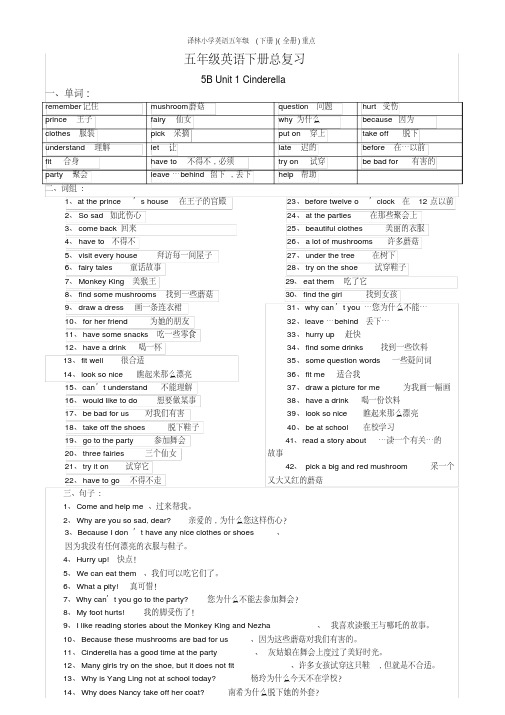
五年级英语下册总复习5B Unit 1 Cinderella一、单词:remember记住mushroom蘑菇question问题hurt受伤prince 王子fairy仙女why 为什么because 因为clothes服装pick 采摘put on 穿上take off 脱下understand 理解let 让late 迟的before 在…以前fit 合身have to 不得不,必须try on 试穿be bad for 有害的party 聚会leave…behind 留下,丢下help 帮助二、词组:1、at the prince’s house在王子的宫殿2、So sad 如此伤心3、come back回来4、have to不得不5、visit every house拜访每一间屋子6、fairy tales童话故事7、Monkey King 美猴王8、find some mushrooms找到一些蘑菇9、draw a dress画一条连衣裙10、for her friend 为她的朋友11、have some snacks吃一些零食12、have a drink喝一杯13、fit well 很合适14、look so nice瞧起来那么漂亮15、can’t understand不能理解16、would like to do想要做某事17、be bad for us 对我们有害18、take off the shoes 脱下鞋子19、go to the party 参加舞会20、three fairies 三个仙女21、try it on试穿它22、have to go不得不走23、before twelve o’clock 在12点以前24、at the parties在那些聚会上25、beautiful clothes 美丽的衣服26、a lot of mushrooms许多蘑菇27、under the tree 在树下28、try on the shoe试穿鞋子29、eat them 吃了它30、find the girl 找到女孩31、why can’t you…您为什么不能…32、leave…behind丢下…33、hurry up 赶快34、find some drinks 找到一些饮料35、some question words一些疑问词36、fit me 适合我37、draw a picture for me 为我画一幅画38、have a drink喝一份饮料39、look so nice 瞧起来那么漂亮40、be at school 在校学习41、read a story about…读一个有关…的故事42、 pick a big and red mushroom采一个又大又红的蘑菇三、句子:1、Come and help me、过来帮我。
新精通版五年级下册小学英语全册单元知识点小结
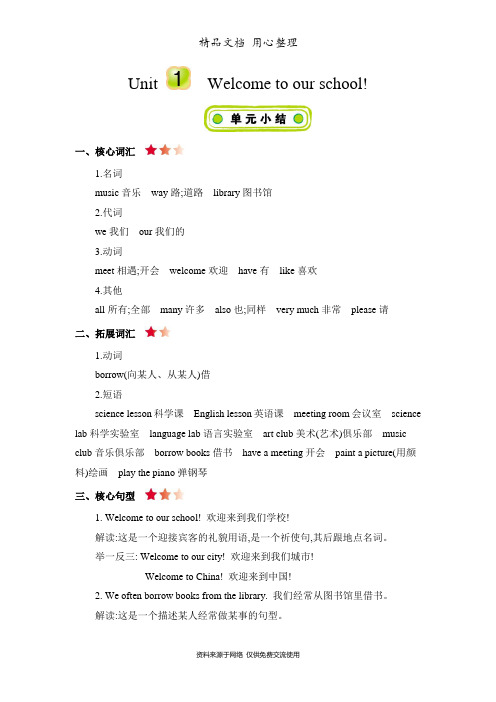
Unit Welcome to our school!一、核心词汇1.名词music音乐way路;道路library图书馆2.代词we我们our我们的3.动词meet相遇;开会welcome欢迎have有like喜欢4.其他all所有;全部many许多also也;同样very much非常please请二、拓展词汇1.动词borrow(向某人、从某人)借2.短语science lesson科学课English lesson英语课meeting room会议室science lab科学实验室language lab语言实验室art club美术(艺术)俱乐部music club音乐俱乐部borrow books借书have a meeting开会paint a picture(用颜料)绘画play the piano弹钢琴三、核心句型1. Welcome to our school! 欢迎来到我们学校!解读:这是一个迎接宾客的礼貌用语,是一个祈使句,其后跟地点名词。
举一反三: Welcome to our city! 欢迎来到我们城市!Welcome to China! 欢迎来到中国!2. We often borrow books from the library. 我们经常从图书馆里借书。
解读:这是一个描述某人经常做某事的句型。
举一反三: They often borrow some English books from Beijing Library. 他们经常从北京图书馆里借一些英语书。
3. —How many English lessons do you have in a week? 你们一周有多少节英语课?—We have three. 我们有三节。
解读:这是用来询问对方有多少节课的句型。
举一反三: —How many PE lessons do you have in a week? 你们一周有多少节体育课?—We have five. 我们有五节。
Module5习题-广州版小学英语五年级下册

Module 5 eating habitsUnit 13 I prefer hamburgers一、单词同步辅导Pizza 比萨饼hamburger 汉堡包burger汉堡包Chinese cabbage 白菜Prefer 更喜欢inside 在里面full 满的peach 桃子二、短语同步辅导Go inside 进去go outside 出去favourite food 最喜欢的实物too full 太饱了Walk back home 走回家Chinese cabbage 白菜三、句型同步辅导1.Which do you prefer, hamburger or pizza? 你比较喜欢哪一种,汉堡包还是比萨饼?2.I prefer hamburger. 我比较喜欢汉堡包。
3.Pizza is more delicious than hamburger. 比萨饼比汉堡包更美味。
4.I’m so full. 我很饱了。
练习:一、请将下面的各类实物名词进行分类,并把单词抄写在相应的表格中。
(tea, pizza, pepper, juice, hamburger, banana, milk, broccoli, coffee, sandwich, orange, cabbage, salad, peach, potato, pasta, ice-cream, rice, bread, grape, tomato, pear, cake,1. I don’t like Coke and I don’t like tea, _________.A. eitherB. tooC. also2. Hamburgers are _________ food.A. ChineseB. westernC.sea3. Xiao ling ________ chips and a sandwich.A. preferB. prefer toC. prefers4. How often do you go to the canteen? ______________A. Every day.B. At twelve o’clock.C. At home.5. Let’s ________ some rice for lunch.A. cookB. cooksC. cooking6. Chinese cabbages, carrots and mushrooms are ___________.A. meatB. milk foodC. vegetables7. I don’t understand the menu. The names of the food are __________.A. strangeB. goodC. delicious三、按实际情况回答问题。
五年级英语下册Unit1cinderella知识点及练习题新版译林

五年级英语下册Unit1 cinderella 知识点及练习题(新版译林)知识点1.Why?Because I can 't gaWhy 为什么回答用Because。
知识点2:clothes 衣服穿上衣服pul 重点单词:重点词组:在王子的家中2 不能去过来帮帮我4 如此的悲伤参加派对6 没有漂亮衣服和鞋子让我来帮你8 穿上新衣服回来10 在12 点之前玩的开心12 在聚会上不得不走14 你的鞋子拜访每一户家庭16 很多女孩试穿鞋子18 它不合适试穿它20 脱下你的外套21 试穿它们22 不得不睡觉23 穿上这件红裙子24 没有翅膀25 帮助灰姑娘26 不得不回来重点句型:王子的家中有一场舞会,但是灰姑娘不能去参加。
2 你为什么这么伤心?因为我不能参加舞会。
3 为什么你不能参加舞会?因为我没有漂亮的衣服和鞋子。
4 灰姑娘穿上了新衣服和鞋子。
她在舞会上玩得很开心。
5 许多女孩试穿了这只鞋,但是不合适。
根据课文内容填空Ta abut Cinderella . Becauvery . A fairy and . Cinderellalothes and . She aat the party. But she go o 'cluns fast andloses( 丢) her . Tany girlbut it . Finally, Cinderella 知识点1:can 的用法1) can 表示能力,意思是“能,会”。
后面直接跟动词原形,用于一切人称和数。
Can 的否定形式为can not ,其缩写为“ can't 。
如:We can speak much English now. 我们现在能说英语了。
2) 表示许可,意思是“可以”。
如:You can watch TV after supper. 晚饭后你可以看电视。
如:You can staax weeks. 你可以再待在这儿六个月。
全册习题(附答案)-小学英语五年级下册
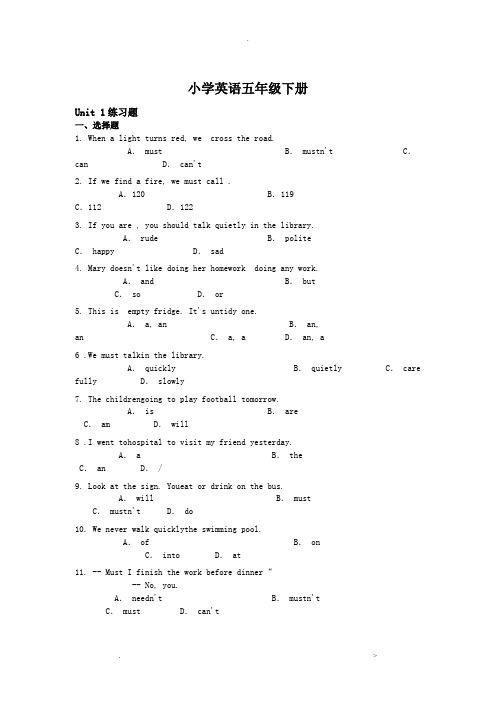
小学英语五年级下册Unit 1练习题一、选择题1. When a light turns red, we cross the road.A. must B. mustn't C.can D. can't2. If we find a fire, we must call.A.120B.119C.112 D.1223.If you are, you should talk quietly in the library.A. rude B. politeC. happy D. sad4. Mary doesn't like doing her homework doing any work.A. and B. butC. so D. or5. This is empty fridge. It's untidy one.A. a, an B. an,an C. a, a D. an, a6 .We must talkin the library.A. quickly B. quietly C. care fully D. slowly7. The childrengoing to play football tomorrow.A. is B. areC. am D. will8 .I went tohospital to visit my friend yesterday.A. a B. theC. an D. /9. Look at the sign. Youeat or drink on the bus.A. will B. mustC. mustn't D. do10. We never walk quicklythe swimming pool.A. of B. onC. into D. at11. -- Must I finish the work before dinner“-- No, you.A. needn't B. mustn'tC. must D. can't12. Weplay at the museum.A. mustn't B. needn'tC. must D. will二、阅读理解〔一〕It is Sunday. Jim doesn't go to school. He and his friends are playing in front of a house. A young man es and asks, "Hello, Jim. Is your father at home“" "Yes, he is," Jim answers.The man knocks at the door. He knocks it for a long time, but no one es to open the door. He says to Jim angrily, "You say your father is at home. Why doesn't he open the door“" Jim answers, "Yes, he is at home. But this is not my home, sir!" 根据短文,判断正(T)误(F):1. Today is Saturday.2. Jim and his friends are going to school.3. They are playing.4. That man didn't know Jim.5. Jim's father isn't at home.〔二〕Tony is a good driver. He is twenty-three years old. He drives a truck on a farm. He works from Monday to Friday. His home is far away from the farm. He gets up at a quarter past five. He goes to work at ten to si* o'clock. At five past seven he must get there. He has no time to have breakfast at home. He leaves the farm at five o'clock. He cooks supper and does housework in the evening.He likes reading a lot. Sometimes he watches TV. He goes to bed at about ten.1.Tony.A.is a worker B.is a truck driverC.teaches on a farm D.makes trucks2.On Saturday and Sunday Tony.A.doesn't go to work B.stays at homeC.goes to the farm D.reads books3., so he has no time to have breakfast.A.He is busy B.His farm is too farC.He doesn't like having breakfast D.He often gets up early 4.He has lunch.A.at home B.in his truckC.on the farm D.in the park5.Hein the evening.A.washes his clothes B.cooks supperC.does housework D.Both B and C〔三〕Bus rulesMolly is a little mouse. She lives with other animals at Animal Land. Everymorning she goes to school by bus with other baby animals. There are a lot of rules for taking the school bus. Here are some of them.You mustn't eat or drink on the bus. You mustn't stretch you head or arms out of the windows. You mustn't talk loudly on the bus. You must sit quietly on the bus. You mustn't play games with others. You mustn't leave the seats or stand up. You mustn't fight.Not every body likes the rules. But rules are rules. Every one has to follow. Molly is a good girl. She always follows the rules.在正确的句子前面写"T〞,错误的句子前面写"F〞.1.You mustn't eat or drink on the school bus.2. You can stand up or leave the seats on the bus.3. You can talk loudly on the bus.4. You mustn't play games on the bus.5. You can stretch your head or arms out of the windows on the bus.6. Molly doesn't follow all the rules.Unit 2 Helping people 练习题一、选择题1. What happenedyou“A. for B. ofC. to D. at2. Li Dongsome fruit yesterday.A. buy B. bought C. buysD. is buying3.I found an umbrella and gave itthe teacher.A. for B. of C. toD. at4.--WhatBettylast week“-- She made a cake.A.did; make B.does; makeC.did; makes D.does; makes5. Mr. Lee had a lot of money but henot happy.A. is B. are C. w as D. were6.-- Did Sueswimming on Sunday“--No, she didn't.A. went B. goes C. goingD. go7. What timeyou usually get up on Saturday“A. do B. did C. doesD. are8. I wantpeople.A. help B. helps C. to help D. helping9.go to the park tomorrow.A. Let's B. We C.Let D. Let's us10 .He was not old but he can't.A. saw B. see C. to see D. Seeing二、阅读理解〔一〕Li Mei's uncle lives in Beijing. Li Mei went there with her parents last National Holidays. They went there by train. It was a long trip.The ne*t morning they arrived at Beijing. Her uncle went to the train station to meet them.Li Mei played happily and ate a lot of good food. They visited the Great wall,the Summer Palace and many other interesting places and took lots of pictures.They hada good time.1. Who lives in Beijing“A. Li Mei. B. Li Mei's uncle. C. Li Mei's parents.2. How did they go to Beijing“A. By bus.B. Bytrain. C. By plane3. Did Li Mei's family visit the Summer Palace“A. Yes, they did. B. Yes, theywere.C. No, they didn't4. Was the trip long“A. No, it wasn't. B. Yes, itwas. C. Yes, there was.5. Did Li Mei and her parents play happily in Beijing“A. Yes,they did. B. No, theydidn't C. Yes, they were.〔二〕阅读猴子和鳄鱼的小短文,然后答复以下问题吧。
广州版小学英语各年级主要知识点归纳
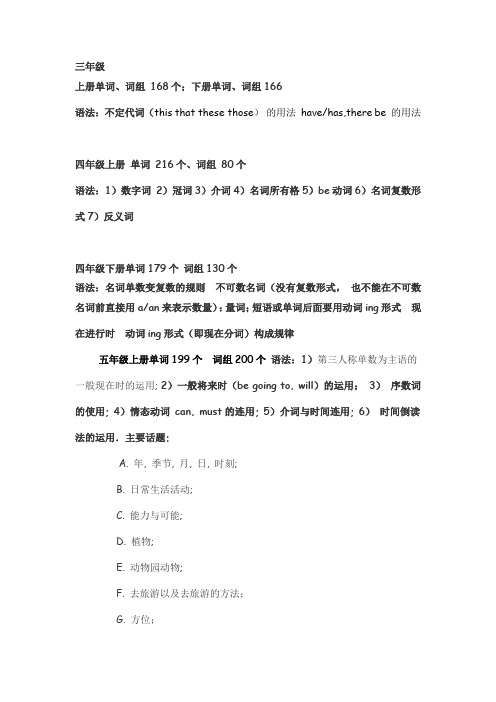
三年级上册单词、词组 168个;下册单词、词组166语法:不定代词(this that these those)的用法have/has,there be 的用法四年级上册单词 216个、词组 80个语法:1)数字词 2)冠词3)介词4)名词所有格5)be动词6)名词复数形式7)反义词四年级下册单词179个词组130个语法:名词单数变复数的规则不可数名词(没有复数形式,也不能在不可数名词前直接用a/an来表示数量):量词;短语或单词后面要用动词ing形式现在进行时动词ing形式(即现在分词)构成规律五年级上册单词199个词组200个语法:1)第三人称单数为主语的一般现在时的运用; 2)一般将来时(be going to, will)的运用; 3)序数词的使用; 4)情态动词 can, must的连用; 5)介词与时间连用; 6)时间倒读法的运用.主要话题:A. 年, 季节, 月, 日, 时刻;B. 日常生活活动;C. 能力与可能;D. 植物;E. 动物园动物;F. 去旅游以及去旅游的方法;G. 方位;H. 问路与应答;I. 规劝与应答五年级下册151个词组125个语法:1)掌握主语为第三人称单数一般现在时的各种句型2)学习和掌握should和shouldn’t的用法3)人称代词和物主代词的用语及正确使用4)形容词、副词的比较级的用法及构成4)I prefer…句型及待客用语的问答5)名词改为形容词的构词方法,如sun— sunny本册书有关于疾病、野生动物、食物等的名词及短语;有关于描述天气特征、人物状态、物体等的形容词还有动词和副词等。
(打电话、看病、询问、量度、用餐、天气)及相关的句型;六年级上册单词107个词组118个六年级下册单词140个词组130个语法:一般过去时;形容词的用法:形容词的比较级变化。
much +比较级;When 引导的时间状语从句--------用when连接前后两个完整的句子;There be句型;宾语从句;时间状语从句;年代的读法;选择疑问句;反意疑问句;连词(and,but,so)的用法;形容物体的形状、颜色、长相等;感叹句的学习;主语+ be 动词+ 形容词;形容词的比较级和最高级;时间表达;情态动词○1can/can’t + 动词原形could/couldn’t + 动词原形○2may/may not + 动词原形○3must/mustn’t + 动词原形(needn’t)Don’t + 动词原形禁止/不允许I hope/wish +句子(can/will/could/动词)我期望……(虚拟)。
五年级下册英语知识点 打印

注:begoing to 问 be going to 答
1.询问对方计划的句型及回答
What you
do ? 你打算做什么?
I’m going to stay at home and watch TV. 我 打算待在家看电视。
2.any和some的用法
3.in a tree和on a 4.should的用法
注;be going to翻译成“打算或计划”+v.原
1.be going to的常用句型结构
I’m going to read a story every day.我打算每天阅 读一个故事。
I’m not going to go shopping tomorrow. 明天我不打算去购物。
What are they going to buy? 他们打算买什么?
例如:about nine a.m. 大约上午九点
—What’s wrong with you? 你哪里不舒服?
3. 让别人提供建议的句型 should 情态动词+v.原 You should take some medicine.你应该吃药。
You shouldn’t go to bed late.你不应该很晚上床睡觉。
2.will构成的一般疑问句
Will Kitty be a teacher? 凯蒂将成为一名教师吗?
3.询问某人将要做什么的句型
What will Peter/Alice do? 彼得/爱丽丝将做什么?
4.询问某人将要住在哪里的句型
Where will he/she live?他/她将住在哪里?
Unit4
for 对于
It’s a wonderful place for a holiday.它是一个度假的好地方。3.by+交通工具
广州版小学英语五年级下册英语重点知识点习题全册

Unit 1 What’s your favourite season?--Look at all the colourful flowers and the beautiful birds in the trees.--I really love spring. What’s your favourite season,Ben?--Summer. I love swimming and summer is the best time for swimming.--Do you like summer, Jiamin?--I like swimming but I don’t like summer. It is too hot. I prefer winter.--When it snows, I can make a snowman.--I don’t like summer and I don’t like winter, either.My favourite season is autumn. It’s very windy and I can fly a kite.看看这些五彩缤纷的花朵和树上美丽的小鸟。
我真的很喜欢春天。
本,你最喜欢什么季节?夏天。
我喜欢游并且夏天是游泳的最佳时间。
你喜欢夏天吗,家明?我喜欢游泳,但不喜欢夏天。
它太热了。
我更喜欢冬天。
下雪的时候,我可以堆雪人。
我不喜欢夏天,也不喜欢冬天。
我最喜欢的季节是秋天。
风很大,我可以放风筝。
一、重点短语:go skiing 去滑雪plant flowers 种花play outdoor 在户外玩look at 看……in the tree 在树上really love 确实喜欢like swimming 喜欢游泳go skiing 去滑雪make a snowman 堆雪人fly a kite 放风筝二、重点句型:1. --What’s your favourite season?--My favourite season is summer.2. –What season do you like best?--I like spring best.三、重点分析:1. in the tree 和on the tree都可以表示“在树上”;in the tree表示外来的东西在树上;on the tree表示树本身的东西。
英语知识点春广东版开心学英语五年级下册全册教案-总结

新开心版小学英语集体备课教案年级:五年级科目:英语编号: 1新开心版小学英语集体备课教案年级:五年级科目:英语编号: 2新开心版小学英语集体备课教案年级:五年级科目:英语编号: 3新开心版小学英语集体备课教案年级:五年级科目:英语编号: 4新开心版小学英语集体备课教案年级:五年级科目:英语编号: 5新开心版小学英语集体备课教案年级:五年级科目:英语编号: 6新开心版小学英语集体备课教案年级:五年级科目:英语编号:7新开心版小学英语集体备课教案年级:五年级科目:英语编号:8新开心版小学英语集体备课教案年级:五年级科目:英语编号:9新开心版小学英语集体备课教案年级:五年级科目:英语编号:10新开心版小学英语集体备课教案年级:五年级科目:英语编号:11新开心版小学英语集体备课教案年级 :五年级科目:英语 编号: 12新开心版小学英语集体备课教案年级:五年级 科目:英语 编号: 13新开心版小学英语集体备课教案年级:五年级科目:英语编号:14新开心版小学英语集体备课教案年级 : 五年级 科目: 英语 编号:15新开心版小学英语集体备课教案年级:五年级 科目:英语 编号: 16新开心版小学英语集体备课教案年级:五年级科目:英语编号:17新开心版小学英语集体备课教案年级 :五年级科目:英语 编号: 18新开心版小学英语集体备课教案年级:五年级科目:英语编号:19新开心版小学英语集体备课教案年级:五年级科目:英语编号:20新开心版小学英语集体备课教案年级 :五年级 科目:英语编号: 21新开心版小学英语集体备课教案年级:五年级科目:英语编号:22新开心版小学英语集体备课教案年级:五年级科目:英语编号:23新开心版小学英语集体备课教案年级:五年级科目:英语编号:24新开心版小学英语集体备课教案年级:五年级科目:英语编号:25。
教科版(广州)最新版小学五年级英语上册Module 1-3 知识点归纳与习题(无答案)PDF版

广州最新版小学五年级英语上册1-12单元知识点归纳与习题Unit 1 What’s your hobby?一、兴趣爱好的词组:grow flowers, study plants, listening to music, singing, dancing, drawing, play the piano, play chess, play basketball…二、句型:1. What’s your hobby?2. Do you like…?Yes, I do. / No, I don’t.3. I love/like…4. I enjoy …5. My (favourite) hobby is …6. …is my (favourite) hobby.7. Is your hobby keeping pets? Yes, it’s. / No, it isn’t.三、重点精析:1. love/like/enjoy doing sth 喜欢做某事如:I like listening to music. 我喜欢听音乐。
他喜欢集邮。
_____________________________________2. My hobby is doing sth 我的爱好是……如:My hobby is reading books. 我的爱好是看书。
我爸爸的爱好是拍照。
___________________________________3. more than… 多于…… , 超过……from 来自于如:I have collected more than 3 hundred stamps from 20 countries.我已收集了来自二十个国家的300多张邮票。
Jane有九十多本英语书。
__________________________________4. every 每一的;每个的every day 每天every night 每晚every year 每年every Friday 每周五5. during + 时间表示在某段时间里during day 在白天during the summer holiday 在暑假期间6. some of + 名词……中的一些如:Some of the students are from America. 这些学生中的一些来自美国。
广州版小学英语五年级下册教材

广州版英语五年级下册教材Unit 1 What’s your favourite season? (4)➢单词 (4)➢重点短语 (4)➢重点句型 (5)➢课文翻译 (5)➢知识点解析 (5)➢习题 (13)Unit 2 It’s the middle of winter (16)➢单词 (16)➢重点短语 (16)➢重点句型 (16)➢课文翻译 (16)➢知识点解析 (17)➢习题 (30)Unit 3 We are going to have an English test (33)➢单词 (33)➢重点短语 (33)➢重点句型 (34)➢课文翻译 (34)➢知识点解析 (34)➢习题 (46)Unit 4 Have a good time in Hainan (50)➢单词 (50)➢重点短语 (50)➢重点句型 (51)➢课文翻译 (51)➢知识点解析 (51)➢习题 (58)Unit 5 Would you like to go with us ? (64)➢重点短语 (65)➢重点句型 (65)➢课文翻译 (65)➢知识点解析 (66)➢习题 (70)Unit 6 See you at the party (73)➢单词 (73)➢重点短语 (74)➢重点句型 (74)➢课文翻译 (74)➢知识点解析 (75)➢习题 (82)Unit 7 We will go by train (85)➢单词 (85)➢重点短语 (85)➢重点句型 (86)➢课文翻译 (86)➢知识点解析 (86)➢习题 (91)Unit 8 Ben’s first trip to Beijing (95)➢单词 (95)➢重点短语 (95)➢重点句型 (96)➢课文翻译 (96)➢知识点解析 (96)➢习题 (103)Unit 9 Be careful (108)➢单词 (108)➢重点句型 (109)➢课文翻译 (109)➢知识点解析 (110)➢习题 (114)Unit 10 How to stay safe (117)➢单词 (117)➢重点短语 (117)➢重点句型 (118)➢课文翻译 (118)➢知识点解析 (119)➢习题 (123)Unit 11 Can you tell me the way? (126)➢单词 (126)➢重点短语 (127)➢重点句型 (127)➢课文翻译 (127)➢知识点解析 (128)➢习题 (134)Unit 12 I know a short cut (138)➢单词 (138)➢重点短语 (139)➢重点句型 (139)➢课文翻译 (139)➢知识点解析 (140)➢习题 (143)Unit 1 What’s your favourite seas on? ➢单词词汇音标中文c o l our ful [ˈkʌləfl] 多彩的*pr e f er[prɪˈfɜ:(r)] 选择;宁愿要w i nt er[ˈwɪntə(r)] 冬天ei th er[ˈaɪðə(r)] 也au t u mn [ˈɔ:təm] 秋天sk i[sk i:] 滑雪pl a nt [plɑ:nt] 植物c a mp [kæmp] 野营go camping 去野营➢重点短语go skiing 去滑雪really love 确实喜欢plant flowers 种花like swimming 喜欢游泳play outdoors 在户外玩fly a kite / fly kites放风筝look at 看……make a snowman 堆雪人in the tree 在树上➢重点句型1. --What’s your favourite season?--My favourite season is summer.2. –Which season do you like best?--I like spring best.➢课文翻译--Look at all the colourful flowers and the beautiful birds in the trees.--I really love spring. What’s your favourite season,Ben?--Summer. I love swimming and summer is the best time for swimming.--Do you like summer, Jiamin?--I like swimming but I do n’t like summer. It is too hot. I prefer winter.--When it snows, I can make a snowman.--I don’t like summer and I don’t like winter, either.My favourite season is autumn. It’s very windy and I can fly a kite.看看这些五彩缤纷的花朵和树上美丽的小鸟。
(完整版)人教版小学PEP英语五年级下册知识点归纳

人教版小学PEP英语五年级下册知识点归纳PEP五年级英语下册各单元知识点Unit 1 My day一、重点词汇。
1.四会词汇:eat breakfast 吃早饭 have···class 上······课play sports 进行体育运动exercise 活动;运动 domorning exercises做早操eat dinner吃晚饭clean my room 打扫我的房间go shopping 去买东西;购物go for a walk 散步take学习;上(课) dancing跳舞;舞蹈 take a dancing class 上舞蹈课2. 三会词汇:when什么时候after 在(时间)后start 开始usually 通常地;惯常地Spain 西班牙late 晚;迟 a.m. 午前;上午 p.m. 午后;下午why 为什么shop 去买东西;购物work 工作last 上一个的;刚过去的sound 听起来好像also 还;也busy 忙的 need 需要play 戏剧;剧本letter 信live 居住island 岛always 总是;一直cave 山洞;洞穴go swimming 去游泳 win 获胜二、其他日常活动。
get up起床 eat lunch吃午饭 go to bed 上床睡觉wash my face洗脸 wash my clothes 洗我的衣服 watch TV看电视play ping-pong打乒乓球 playthe pipa弹琵琶 go swimming去游泳go running去跑步 do homework 做作业 do kung fu练武术play football踢足球 play basketball打篮球三、频度副词。
always总是,一直(100%) usually通常(80%)often 经常(60%) sometimes(30%)有时四、疑问词。
广州版小学英语五年级下册U11what animal can run fastest

4) What does a cheetah look like?
1) What’s Ben’s favourite animal? His favourite animal is the horse. 2) What animals can run faster than horses?
Cheetahs can run faster than horses.
A Polar Bear
This is a polar bear. It is white. It is very strong and big. It is very dangerous.
It looks like a bear. It lives in the Arctic. It has two small eyes and two small ears. It likes eating meat.
A Polar Bear
This is a polar bear. It is white. It is very strong and big. It is very dangerous. It has two small eyes and two small ears. It looks like a bear. It lives in the Arctic. It can walk slowly. It likes eating meat. I like it very much.
They are big and strong. They have two big ears and a long nose. They’re the biggest animals on land. They live in Africa.
广州版小学英语五年级下册:Unit 7 We will go by train

Unit 7 We will go by trainFocus PointsLet’s TalkDo you have any plans for the holiday? Where will you go? Please talk about with your partner. Warming Up一.听写二、单词及短语1.乘,由_______________________2. 火车________________________3.离开_________________________4. 激动的______________________5.岛___________________________6. 出租汽车____________________7.美国_________________________8. 美国的______________________9. 澳大利亚的___________________10. 计划_______________________ 11. 步行________________________ 12. 在......期间__________________ 13. 喂养________________________三.课文内容根据提示把句子补充完整。
Janet: Do you have any ________ for the holiday?Ben:Yes. I ________ _________ _________with my family. We ________ ________ ________ Shenzhen.Xiaoling: How will you go there?Ben: We will _________ _________ _________. (将会坐火车)We will leave__________ _________ _________.(10月2日)I can’t wait.Janet: It’s very _________.(这真令人感到兴奋)What will you do in Shenzhen?Ben:Well...we ________ ________ _________ _________Window of the World, of course. And I want to go to Happy Valley, too.Janet: _________ _________ _________ come back home?(打算什么时候回家?)Ben: We will come back home on October 4th .Language Points【知识考点一】I will go travelling with my family. 我将和我的家人去旅行。
广州版五年级英语下册知识要点汇总
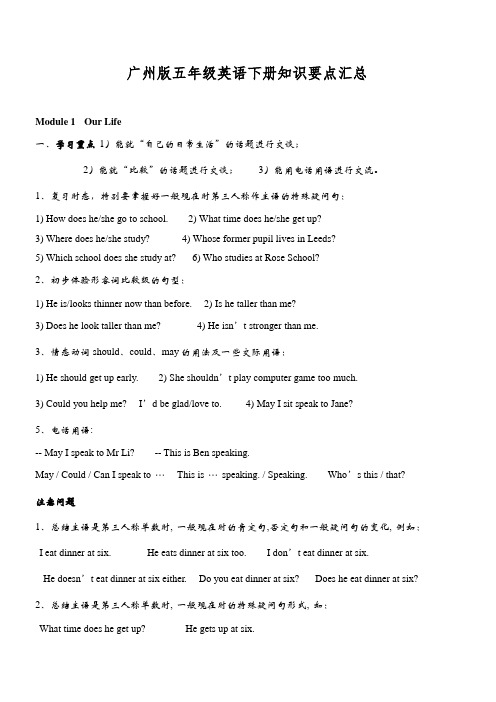
广州版五年级英语下册知识要点汇总Module 1 Our Life一、学习重点1)能就“自己的日常生活”的话题进行交谈;2)能就“比较”的话题进行交谈;3)能用电话用语进行交流。
1、复习时态,特别要掌握好一般现在时第三人称作主语的特殊疑问句:1) How does he/she go to school. 2) What time does he/she get up?3) Where does he/she study? 4) Whose former pupil lives in Leeds?5) Which school does she study at? 6) Who studies at Rose School?2、初步体验形容词比较级的句型:1) He is/looks thinner now than before. 2) Is he taller than me?3) Does he look taller than me? 4) He isn’t stronger than me.3、情态动词should、could、may的用法及一些交际用语:1) He should get up early. 2) She shouldn’t play computer game too much.3) Could you help me? I’d be glad/love to. 4) May I sit speak to Jane?5、电话用语:-- May I speak to Mr Li? -- This is Ben speaking.May / Could / Can I speak to …This is …speaking. / Speaking. Who’s this / that?注意问题1、总结主语是第三人称单数时, 一般现在时的肯定句,否定句和一般疑问句的变化, 例如:I eat dinner at six. He eats dinner at six too. I don’t eat dinner at six.He doesn’t eat dinner at six either. Do you eat dinner at six? Does he eat dinner at six?2、总结主语是第三人称单数时, 一般现在时的特殊疑问句形式, 如:What time does he get up? He gets up at six.Where does she live? She lives in Renmin Road.3. 当主语是第三人称单数时, 一般现在时的动词的变化的规律:1) 一般情况加-s,例如:visit –visits tell –tells work –works wave –waves2)以s, x, sh, ch结尾的动词, 加-es,例如:wash –washes watch –watches3) 以辅音字母加y结尾的动词,改y为i加-es,例如:fly –flies study –studies4) 部分以o结尾的动词加-es,例如:go –goes do –does5) 特殊情况have –hasUnit 11、for an hour for表示时间的长度,例如:for two year half an hour an hour and a half2、注意句型:Could you …? I’d be glad to. / I’d love to.3、比较级句型:She is older than me. She is one year older than me.4、keep the rule 守规律;守规则Unit 21、电话用语: May / Could / Can I speak to …This is …speaking. / Speaking. Who’s this / that?2、He looks thinner now than before. 他现在看起来比以前瘦很多。
pep小学五年级下册英语语法知识点 全册
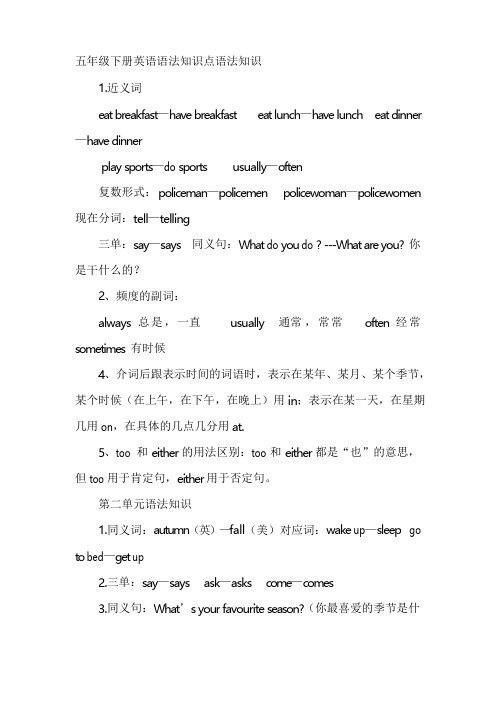
五年级下册英语语法知识点语法知识1.近义词eat breakfast—have breakfast eat lunch—have lunch eat dinner —have dinnerplay sports—do sports usually—often复数形式:policeman—policemen policewoman—policewomen 现在分词:tell—telling三单:say—says同义句:What do you do?---What are you?你是干什么的?2、频度的副词:always总是,一直usually通常,常常often经常sometimes有时候4、介词后跟表示时间的词语时,表示在某年、某月、某个季节,某个时候(在上午,在下午,在晚上)用in;表示在某一天,在星期几用on,在具体的几点几分用at.5、too和either的用法区别:too和either都是“也”的意思,但too用于肯定句,either用于否定句。
第二单元语法知识1.同义词:aut umn(英)—fall(美)对应词:wake up—sleep go t o bed—ge t up2.三单:say—says ask—asks co me—comes3.同义句:What’s your favourite season?(你最喜爱的季节是什( 么?)----Which season do you like best?(你最哪个季节?)4.表示天气的介词。
当表示某地某个季节的天气情况时,要把季节放在前面,地点放在后面。
其结构为:What ’s the weather like in季节 in 地点?第三单元主要语法点:1、关于月份:(1)五月 May , 六月 June, 七月 July ,没有简写 形式。
九月 September 的简写形式是前四个字母加点 Sept. 其他八个月的简写形式是前三个字母加点。
小学英语科普版(三起)五年级下册全册知识点(分单元编排)

五年级英语下册知识点总结Unit 1 May I speak to Mary?【重点词汇】speak 说,讲注意句子中的长元音/i:/afternoon 中午注意句子中的字母组合的发音/u:/job 工作(可数) work 不可数learn 学习(教授) study 学习(自学)【重点短语】use your bike go home now ask you a question watch TV now 【重点句型】1.May I speak tosb.?2.May I use your……?3.She is notin.她不在4.Can you ask herto call me this evening?5.What are youdoing now? I am having lunch.6.What about=Howabout7.Can I learn howto make it?8.Let’s me putsome meat on it,OK?9.You did a goodjob.【重点语法】1.情态动词can/may 表示请求,委婉的态度,后面加动词原形2.现在进行时的用法Unit2 We mustn’t cross the street now?【重点词汇】must 必须,后面加动词原形street 街道,注意单词中的ee的字母组合answer 回答,答复cross 动词:穿过【重点短语】Answer the question 回答问题All right 好No left turn 不要左转left turn 左转no parking 禁止停车parking 停车No u-turn 不能转弯U-turn 转弯【重点句型】1.Are you going shopping?2.You mustn’t run in the street.3.You mustn’t cross the street here.4.You can cross the street there.5.I should give my seat to her.【重点语法】情态动词must的用法Must+动词原形Unit3 How many pupils are there?【重点词汇短语】Blackboard 黑板 pupil 小学生Paper 纸张 should 应该Pick 捡起 throw away 扔掉Pick up捡起【重点句型】1.How many pupils are there in your class this term?2.There are/is n.3.we have a new clock and we have some green plants.4.This make the streets and parks very dirty.5.Many of the things are useful.6.The pupils are doing a good job, and they are very happy. 【重点语法】1.there be句型2.数词的用法—基数词Unit4 Where do youlive?【重点词汇】Live 居住 town 注意发音Sick 病的注意ck的发音Come from 来自Be ready to 愿意做某事【重点句型】1.Where do you come from?2.Where do you live?3.Where are you from?4.Why are you crying?5.He is always ready to help others.6.They walked for along time.7.The farmer took our some money.Unit 5 What do you do?【重点词汇】Easy 容易的 kind 和蔼的Choose选择Which 哪一个Manager 经理Interesting 有趣的【重点句型】1.What do you do?2.Where do you work?3.Is your work interesting?4.Go and find your manager.5.Now Mr.Smith knows who to choose.Unit7 It’s seventhirty-five【重点词汇】Breakfast 早餐Monday 周一Fifty 50Way 路Try 尝试Tuesday 周二Thursday 周四Wednesday 周三Fill 填满On the way 在……路上【重点句型】1.What time is school over?2.What about Monday and Wednesday ?3.What time is it?4.It’s time for school.5.On the way they see a boy.6.They try to take the ball out.7.They get some water and fill the hole with it.8.The boy smiles and thanks them for their help.【重点语法】1.数词—家属次2.时间的表示方法和提问Unit8 What day is it today?【重点词汇】Math 数学Art 艺术PE 体育Science 科学Subject 学科When 当……的时候Lesson 课Hope 希望Soon 不久【重点句型】1.What day is it today?2.What classes do you have this morning?3.When do you have English?4.We have Chinese and PE.5.I want to make a new timetable.6.Lulu is writing an email to her now.7.Let me tell you what we did today.8.Hope to see you soon.【重点语法】1.星期的说法2.关于科目的单词3.关于课程的询问Unit 9 Do you always have lunch at twelve?【重点词汇】Rice soup exercise kitchen toilet early bedroom usually【短语】have lunch 吃午饭 get up 起床 do morningexercise 做晨练【重点句型】1.What time is it?2.Do you always have lunch at twelve?3.What do you usually have for lunch?4.I always do morning exercises at 7:10.5.I have to run to school.6.The clock in my room isn’t working.【重点语法】1.时间的询问2.一般疑问句和特殊疑问句Unit10 Does she always come before six thirty?【重点词汇】Before afraid stand suddenly someone get out eachother【重点句型】1.Where is she today?2.Does she always come before six thirty?3.I am afraid she isn’t feeling well today.4.Suddenly they hear someone crying.5.Then they have an idea.6.They get a lot of grass and throw the grass onto the pit.【重点语法】1.一般疑问句的单三形式2.动词【短语】的积累Unit11.When do you usually get up?【重点词汇】Far minute by slow daughter telephone ring 【短语】By bike on foot have breakfast for a minute 【重点句型】1.When do you usually get up?2.How do you usually go to school?3.Her home is not far from the school.4.What time does peter go to school?5.How is he going?6.When so they go to bed?7.He talks to her for a minutes.8.Why are you still having breakfast?【重点语法】问时间的特殊疑问句Unit12. Revison【重点句型】1.What day is ittaday?2.What time is it?3.When do you usuallyget up?4.How do youusually go to school?5.The TV is on thewall.6.When I talk tomy friend on it, I can see him.7.I often use itto send emails to my friends.8.I want a machineto help me so my homework.五年级英语下册知识点总结Lesson 11、May I speak to Mary? Sorry, she’snot in.我可以和玛丽通电话吗? 对不起,她不在。
广州版小学英语五年级下册:Unit 11 Can you tell me the way

Unit 11 Can you tell me the way?Focus PointsLet’s TalkDo you know the way to the market from your house? How can you get there? Please talk about it with your partner.Warming Up一.听写二、单词及短语1.在......后面______________________2. 在......旁边_____________________3.靠近,紧邻_____________________4. 在...... 前面____________________5.在右边_________________________6. 在左边________________________7.在......附近______________________8. 方向__________________________9. 路_____________________________ 10. 迷路的_______________________ 11. 医院__________________________ 12. 笔直地_______________________ 13. 错过__________________________ 14. 银行_________________________ 15. 邮局__________________________ 16. 火车站_______________________ 17. 饭店__________________________ 18. 警察局______________________三.课文内容根据提示把句子补充完整。
Janet: Oh, dear! I think we’re________.Ben: Let’s go and ask the lady ________ there.Janet: Excuse me. ________ you tell me the ________ ________ the hospital, please?Lady: Of course. Let me see. Go ________ ahead then turn right ________ the second ________. Ben: Is the hospital on the left ________ on the right?Lady: It’s the building on your right, ________ to the school. You can’t ________ it.Janet and Ben: Thank you so much.Language Points【知识考点一】Can you tell me the way to the hospital, please? 请问你能告诉我去医院的路吗?the way to... 意为“到......的路”can意为“能,可以”,是情态动词,无人称和数的变化,后面接动词原形。
重大版小学英语五年级下册知识点汇总

小学英语五年级下册复习资料Unit 1 Good Helpers重点词汇:clean the room打扫房间wash the socks 洗袜子make the bed整理床铺do the dishes 洗碗cook the dinner 做晚饭water the plants 给植物浇水put away the clothes 收拾衣服take out the rubbish倒垃圾相关词汇:often 经常;常常sometimes 有时parents 父母helper 帮手kids 孩子们Mother’s Day 母亲节at once 马上重点句型:1.---Do you help your parents at home? 你在家会帮助父母吗?---Yes, I do. / No, I don’t.是的,我会。
/ 不,我不会。
2.---What do you do at home? 你在家会做些什么?---I often do the dishes. 我经常洗碗。
3.---What can you do for your parents? 你能为父母做些什么?---I can cook the dinner. 我会做晚饭。
4.---Does Max often help his parents? 麦克斯会经常帮助他的父母吗?---Yes, he does. / No, he doesn’t. 是的,他会。
/ 不,他不会。
5.---Let’s get to work at once. 我们马上行动吧。
相关句型:1.I often clean the rooms. 我经常打扫房间。
2.He often makes the bed. 他经常整理床铺。
3.Sometimes I wash my socks. 有时我洗自己的袜子。
4.I can water the plants. 我会给植物浇水。
5.Lu Hua can cook the dinner. 卢华会做晚饭。
教科版(广州)英语五年级下册全册知识点归纳

教科版五年级下册基础知识汇总Unit !What's your favourite season?【重点单词】1.colourful多彩的 5.ski滑雪2.winter冬天 6.plant种植;植物3.either也7.camp野营:营地4.autumn秋天8.prefer选择,宁愿要【重点短语】I.go skiing去滑雪7.in the trees在树上2.plant flowers丰中花8.favourite season最喜欢的季节3.play outdoors在户外玩耍9.too hot太热4.go camping去野营10.make a snowman堆雪人5.colourful flowers多彩的花11.fly a kite放风筝6.beautiful birds 漂亮的鸟12.eat ice cream吃冰激凌【重点句子】1.-What’s your favourite season,Ben?本,你最喜玫什么季节?-Summer.夏天。
I)此问句用于湖问对方最喜欢付么季节。
2)答语为“(My favourite season is十)季节名称.”。
3)其中your是形容词性物主代词,意为“你的:你们的”。
4 )fav omite的意思是“最喜欢的”。
例如:-What’s your 臼vomite season, Mike?迈克,你最喜欢什么季节?-Winter.冬天。
2.1 love swimming and summer is the best time for swimming.我喜欢游泳,夏天是游泳最好的时候。
l)Ei11:t称十比川巳st time for+t9J词叫形式(十其他)明来描述某季节是做某活动最好的时候。
2)其中best意为“最好的”。
3)for是介词,后接动词ing形式。
例如:Winter is the best time for skiing.冬天是泪’雪最好的时候。
